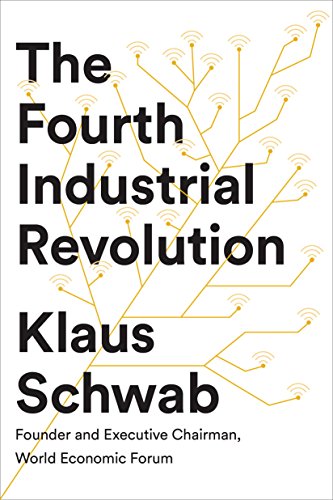You have /5 articles left.
Sign up for a free account or log in.
 The Fourth Industrial Revolution by Klaus Schwab
The Fourth Industrial Revolution by Klaus Schwab
Published in January of 2017.
Earlier this week I recommended that higher ed people read McAfee and Brynjolfsson’s new book Machine, Platform, Crowd with a higher ed lens.
The Fourth Industrial Revolution covers some of the same ground. While lacking some of the analytical insights and nuanced arguments of Machine, Platform, Crowd, I’d still recommend the book as a worthwhile complement in helping us expand our thinking about the future of our postsecondary industry.
Perhaps it is no surprise that Schwab, the founder and executive chairman of the World Economic Forum (Davos), believes that we are living through a time of profound technologically driven change.
For Schwab, the 4th Industrial Revolution represents a non-linear break with previous economic orders. Earlier Industrial Revolutions based on advances in steam-powered transportation and mechanical production (late 18th century), standardized electrically powered mass production (late 19th century), and the computer revolution (late 20th century). The 4th Industrial Revolution, according to Schwab, is the integration of digital, physical, and biological systems.
Embedded within the 4th Industrial Revolution are new industries and modes of production made possible by advances in artificial intelligence (A.I.), the Internet of Things (IoT), 3-D printing, autonomous vehicles, biotech and nanotech, and green energy production and energy storage.
What The Fourth Industrial Revolution and Machine, Platform, Crowd have in common is an argument that we are on the precipice of fundamental changes to our economic order. Further, these technologically driven shifts have the potential to further drive economic inequality, and to concentrate wealth and power amongst a small set of companies and individuals.
It seems to me that those of us who work in higher ed should spend more time thinking about how our industry may be impacted by 4th Industrial Revolution type shifts.
The issue may be less about what the future of college may look like, and more what higher ed will look like if advantage becomes further concentrated amongst a small number of institutions.
In other information industries, it appears that the move to a platform-based and data-intensive economy, is providing a few firms (such as Amazon, Google, Apple, Facebook, and Microsoft) with advantages that are disproportionate to their societal contributions. In higher ed, it seems as if it is nobody’s interest to concentrate privilege amongst a very few incumbents - while large numbers of institutions are left vulnerable to unfavorable trends in shifting demographics and rising costs.
How can we better apply a technological change lens to understand the future of higher ed as an industry?
Why is it that books about technological induced economic change tend to focus on every other information industry except for higher education?
What are you reading?




